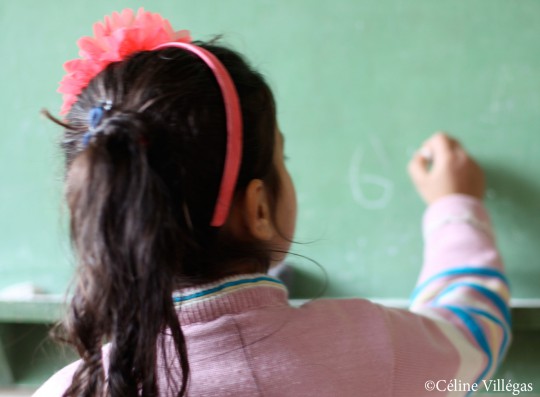Do you want to change the world? You're in the right place! Join us at W4 in empowering girls and women for the benefit of everyone! You can donate to our projects around the world, launch your own team fundraiser, (e-)volunteer your skills and/or spread the word about our work!
How does it work?
Choose one or more projects you care about from our portfolio of projects around the world, make a donation and see the life-changing, even life-saving, impact of your giving!
How does it work?
Create your own uber-cool fundraising team to raise funds for (a) project(s) you care about, then invite your friends/colleagues/family to donate and change the world with you! Multiply the good and multiply your impact!
How do gift cards work?
Offer a friend/colleague/loved one a unique, unforgettable gift with a W4 gift card! When you offer a W4 gift card, the recipient of your gift can choose a project to support from among our many girls' & women's empowerment projects around the world. The recipient of your gift card will receive updates throughout the year about the project, as well as W4 "goodies" relating to the project. So offer a W4 gift card today and spread joy & love!
14235
Prevent conflict from interrupting the schooling of syrian refugee children

The Challenge
The armed conflict in Syria has persisted for over 4 years, forcing 10 million people to flee their homes. It’s estimated that there are now 6.5 million internally displaced persons in Syria and 4 million refugees who have crossed the borders into neighbouring countries. A large proportion of these refugees are children.
Every day, thousands of Syrian refugee children arrive in neighbouring Lebanon, a country whose education system is already greatly under-resourced. Today, there are more than 500,000 school-aged Syrian refugee children living in Lebanon, most of whom do not have access to education (formal or informal). We must act as quickly as possible to ensure that these children do not become part of a lost generation and are instead educated to become active citizens of the future.
The solutions we're proposing
W4’s Field Partner in Lebanon Yalla! Pour les Enfants works to defend Syrian refugee children’s human right to an education. The team works to get Syrian children who have been taken out of school as a result of the conflict back into education. The program also participates in community conflict prevention and peace building between different ethnic and religious groups as well as between the refugee populations and host communities in Lebanon.
Yalla! opened a first school for Syrian refugee children in the Karam Zeitoun neighbourhood in Beirut in 2014, providing adapted education to help Syrian children achieve an educational level that would permit them to access the formal Lebanese education system. This program has been very successful; all of the children who attended the school have had the opportunity to successfully integrate into the Lebanese education system. Thanks to the generosity of W4 donors, in October 2014 a second school was opened in Aley, a village on Mount Lebanon, 20 km from Beirut.
Currently, Yalla! humanitarian project in Lebanon is divided into three parts:
- The creation of an informal school for Syrian refugee children in Aley. Each year, the classes accommodate around 200 children who would otherwise have no access to education.
- The integration of school-aged refugees into the Lebanese education system. The education that Yalla! provides not only increases the children’s levels of education but also, above all, helps them to rediscover a taste for school and gain the confidence necessary to continue with their education.
- The organisation of fun activities for both Syrian and Lebanese children. These shared moments contribute to the development and integration of refugee children and to inter-communityl dialogue.
THE IMPACT OF GIVING
When you donate to support Yalla!, you give 200 children access to a quality education, adapted to their needs, in a safe environment. Thanks to the teaching methods that Yalla! employs, the children rediscover their love for school and gain the confidence to reintegrate into education. You help to reduce the risk that these children will become victim to a vicious cycle of begging on the streets and violence.
Your caring support also allows the children’s parents a few hours of freedom to work or, in many cases, to search for a job or complete essential administrative processes relating to their refugee status and application for humanitarian aid.
Your participation contributes to peace building between host communities and refugees, allowing for greater acceptance and understanding between them.
WHY FUND US?
Your help can renew hope among and bring a smile back to the faces of refugee children. Thanks to you, children can overcome trauma and learn how to be children again: free to learn, to play, to make mistakes (small ones, that is!)…
The Yalla! programs have proven their effectiveness at integrating Syrian refugee children into the Lebanese education system: nearly 100% of the children who attended school in Karam Zeitoun, Beirut, and 50% of the children who attended their school in Aley successfully integrated into and continued with their education in Lebanese schools.
Join us in providing vital educational opportunities for Syrian refugee children so that they are not “a lost generation”.
Support us by sharing
and raising awareness!
Contributors
Stephanie
CanadaGamand
FranceClémence
FranceMary
FranceDonnez, soutenez, c'est indispensable pour l'avenir des enfants !
Gunar
FranceCécile
FranceFélicitations pour votre travail aussi utile que dynamique

Sophie
FranceYalla!!!
Anonymous
FranceAnonymous
FranceCharlotte
France“Happiness is when what you think, what you say, and what you do are in harmony.” ? Mahatma Gandhi. If you think children should go to school, you can help them easily by supporting a beautiful educa
Anonymous
FranceWe can't go on pretending day by day / That someone, somewhere will soon make a change
Luz
SpainJuliette
FranceBarbara
Germany
Vincent
FranceMadina
FranceYalla Yalla !
Louise
United KingdomLaura
LebanonLaura
LebanonAnonymous
France
Vincent
FranceGwen
FranceKen
United KingdomFor Ben and Laura's wedding
Mark & Rachael
United KingdomLaura&Ben’s marriage
Malika
FranceTim
United KingdomLaura and Ben wedding
Sareta
SwitzerlandLaura & Ben's wedding
Anonymous
ItalyMargaret
United KingdomLaura and Ben's wedding
Marie-Anne
FranceMarjorie
FranceClotilde
FranceJacques
FranceJacques
FranceLeila
Francenada
Francephil
FranceAnonymous
FranceAnonymous
FranceSophie
FranceHind
Franceélodie
FranceLucie
FranceAnonymous
FranceLouis
FranceAnonymous
United KingdomDominique
FranceVincent
FranceHenri
Franceirenee
FranceSuper initiative !
claire
FranceJe souhaite beaucoup de succès à l'équipe qui accueille les enfants au centre d'enseignement. Que Dieu vous accompagne dans votre démarche
Anna
FranceAnonymous
FranceBravo et merci pour eux
Anonymous
FranceDove
CanadaJonathan
United StatesDuncan
United StatesMARIE
FranceAnne-Sophie
FranceAline
SwitzerlandAnonymous
BrazilChristophe
FranceIYADE
France
Stéphanie
FranceMarc
FranceSarah
BelgiumV
United KingdomCarlo
United Arab EmiratesArun
United StatesMd Arifur
GermanyRenaud
Franceje sors de votre conférence qui était passionnante / merci !

Vincent
FranceAnonymous
FranceStephanie
FranceMahmoud
West BankBrandon
FranceAnonymous
United StatesAmandine
LebanonBrittany
FranceI can't keep seeing the faces of these precious children on the news and do nothing. Until we find a sustainable solution to the refugee crisis, I'm happy to make a small contribution to help ensure t
Céline
TunisiaCarline
FranceUne généreuse initiative, bravo !
Alejandro
SpainSoizic
United StatesAmy
United StatesBon courage, Charlotte et les enfants! Gros bisous, Amy :)
Anonymous
FranceAnonymous
FranceMarion
FranceCaroline
Mexicojerome
FranceAnonymous
FranceAnonymous
FranceAriane
FranceAgnès
Francepierre
FranceAnonymous
FranceContinuez et bravo pour tout ce que vous faites. DPM
Yasmine
FranceAnonymous
FranceCharlotte
FranceL'exil n'est pas une fatalité, mobilisons nous, continuons à donner de l'espoir aux enfants!

Ali T
FranceMary
FranceParticipons largement à l'école pour la paix de Yalla! Pour les Enfants
ANTOUNE
FranceAnonymous
FranceAnonymous
FranceJuliette
FranceEnrico
SwitzerlandJe soutiens ce projet ! Je ne peux pas être sur place, mais je peux donner un peu d'argent.
Anonymous
FrancePhilippe
FranceAnonymous
LebanonNicolas
FrancePascaline
FranceAnonymous
FranceContinuons à construire l'avenir, ensemble !
Nelly
Francemantegazza
ItalyCollet
FranceAlice
FrancePour construire un avenir meilleure, l'éducation des enfants est la source ....
Anonymous
FranceAlexHelene
GermanyEmmanuel
Francechristine
FranceAnonymous
FranceAnonymous
FranceMARION
French GuianaMike
BelgiumAnonymous
Francepour l'association Yalla!
Mary
FranceNous avons dépassé la moitié de notre objectif, bravo! Continuons, parlons en autour de nous, donnons pour que ces enfants, exilés, continuent à s'instruire, la clé de leur devenir.
Nadia
FranceMerci Yallah pour votre travail continue en faveur des petits Syriens !
Luz
Francemathilde
FranceJean luc
FranceGunar
FranceAnonymous
FranceCharles
Belgiummarie-noëlle
FranceJohn
United KingdomJacqueline
Francejerome
FranceAnonymous
United StatesAnonymous
Reunion IslandAnonymous
FranceAnonymous
Francecarole
FranceMerci pour cette belle initiative. Au delà du don financier, dites leur qu'ils sont dans nos pensées au quotidien !
Marie
Francelisa
Francemélanie
Francejenny
SwedenTaylor
France
Stéphanie
FranceAnonymous
SwedenKeep up the fantastic work!!
Anne-Sophie
FranceAli
FranceGunar
FranceAnonymous
SpainNick
United KingdomLaura&Ben's marriage
Firas
Francepour l'espoir, on doit donner un avenir à ces innocents
Jose
Congo, Dem. RepublicAmahoro
Julia
FranceMerci a Laura et Ben de nous permettre de connaitre ce projet et de pouvoir aider les enfants syriens a suivre une scolarité et leur permettre d'envisager un futur. Julia et Nico
John
United Kingdommatthew
ItalyLaura&Ben’s marriage
Anonymous
ItalyGraziella
FranceMary
FranceMerci pour votre générosité! Grâce à vous, des enfants vont poursuivre leur scolarité à la rentrées scolaire 2015/2016. Demeurons volontaires et déterminés.
Giulia
Italydominique
FranceAnne-Laure
FranceMaria
FranceAntoine
FranceYalla les petits et les grands !
Annie
FranceHeidi
FrancePia
FranceMerci à tous pour ces projets concrets et combien nécessaires !
Anonymous
FranceGunar
FranceBAPT
ItalyBravo pour ton engagement remarquable pour une cause importante
Amandine
HaitiCHARLOTTE
FrancePosez une pierre d'une école pour la paix
lamis
FranceMourad
FranceNicholas
United KingdomLaura and Ben's Wedding
Lena
JordanLaura&Ben's marriage
Anonymous
Francesophie
Francesophie
FranceDavid
ItalyLaura & Ben’s marriage
Anonymous
ItalyErdal
SwitzerlandLaura&Ben’s marriage. Ho ho ho. ;-) Erdal
Dora
FranceMassimo
ItalyPascaline
FranceClaire
LebanonAnonymous
FranceMarilyn
FranceJane
United KingdomFor Ben and Laura's wedding - with pleasure and admiration
Maria Luna
ItalyLaura&Ben’s marriage
Valentina
ItalyLaura &Ben's marriage
Ahmed
ItalyEnrico
ItalyLaura and Ben's Marriage
Donate to this project
ARE YOU SURE YOU WANT TO DELETE?
ARE YOU SURE YOU WANT TO DELETE?
Are you sure ?
Uploading your photo now...
These fields must be completed before you can submit your project :
Save your draft first
In order to submit your project to our team, you have to save it first
Save your draft first
In order to translate your project, you have to save it first
Submit project translation
To proceed, please tick the ?Translation Available? box on the upper right hand side of your project drafting page.
Submit your translation
You are about to submit your translation. After submission, you will not be able to include further edits to your translation until it has been approved by our team.
Select 1-3 categories relevant to your project :
Digital Inclusion
Disabilities
E-mentoring
Economic empowerment
Education
Emergency Relief
End Child Marriage
Environment
Food Security
Health & HIV/AIDS
Human Rights
Human Trafficking & Exploitation
Microfinance
Role models
Technology
Violence against women

















